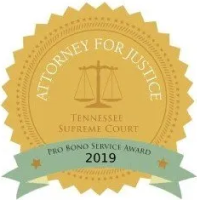You Need It Most
Divorce
Our team of divorce attorneys understands that divorce is an overwhelming, complicated and emotional event for you and your family. You can remain confident our team of attorneys understands the divorce process and will provide sound, compassionate advice from our first moment of introduction. There are several types of divorce in Tennessee and the law recognized many statutory reasons for divorce, called grounds for divorce. Many people erroneously believe that Tennessee is a “no-fault” state. If people agree on all aspects of a divorce, it can be grated in a divorce known as an ID divorce which stands for Irreconcilable Differences. However, if there is even one thing which the parties do not agree upon, the divorce is contested and grounds must be proven if not stipulated.
Contested v. Uncontested Divorces in Tennessee:
There are two types of divorces in Tennessee. The first kind is an uncontested divorce. An uncontested divorce means both parties agree on literally everything and our lawyers draft a Marital Dissolution Agreement, Permanent Parenting Plan, Final Decree of Divorce, and Divorce Certificate. All of these documents must comply with the court rules. If they do not, the court will not approve them. If there are children involved and a Permanent Parenting Plan is needed, the parties must set child support in accordance with the Tennessee Child Support Guidelines. Occasionally, deviations are permissible for good cause. Deviations in child support must be proven and approved by the court. The ground for an uncontested divorce is called irreconcilable differences or an ID divorce. If you and your spouse cannot agree, such as on the division of marital property (401K accounts, retirements, pensions, and personal property), spousal support and alimony, child visitation, custody, and child support, among other things, then you must prove grounds for divorce. Tennessee courts require mediation prior to obtaining a trial date for completion of the matter. Temporary motions and emergency motions are common to make sure the all of the bills are being paid while waiting for a trial date or to keep the peace.
Our team of Goodlettsville family lawyers provides years of experience in the local area to help negotiate on your behalf, guide you through the process, fight for you in the courtroom, and inform you of the current Tennessee law and common practices among the local courts including Davidson County, Sumner County, and Robertson County.
Under T.C.A. § 36-4-101, Tennessee law recognizes the following grounds for divorce, to summarize:
- Irreconcilable differences between the parties;
- Adultery;
- Cruel and inhuman treatment or conduct towards the spouse as renders cohabitation unsafe and improper;
- Living apart for two years with no minor children;
- At the time of marriage, either party was and still is naturally impotent (sterile) and incapable of procreation;
- Bigamy, either party has knowingly entered into a second marriage;
- Willful or malicious desertion or absence, without a reasonable cause, for one year;
- Convicted of any crime that, by the laws of the state, renders the party infamous;
- Convicted of a felony, and sentenced to confinement in the penitentiary;
- Refusal to move to Tennessee with your spouse, without a reasonable cause, and being willfully absent from the spouse for two years;
- Wife was pregnant at the time of the marriage, by another person, without the knowledge of the husband;
- Habitual drunkenness or abuse of narcotic drugs, when the spouse has developed the habit after marriage;
- The husband or wife has offered indignities to the spouse’s person as to render the spouse’s position intolerable, and thereby forced the spouse to withdraw;
- Abandonment for no just cause, and refusal and neglect to provide for the spouse while having the ability to provide; and
- Spouse has attempted the life of the other, by poison or any other means showing malice.
Distributing Property
When obtaining a divorce, parties often wonder how their property will be distributed. Often, parties are able to agree on the disposition of all of their marital property, including real and personal property. Real property is a house or land. Personal property is your “stuff.” If unable to agree, Tennessee courts must first determine what marital property is and what is considered separate property. Separate property is not divisible by the court. It would include such things as an inheritance that is typically kept separate or investments accounts kept separate and owned prior to marriage, to name a few. The court makes an equitable division of the marital property in the estate. Equitable does not necessarily mean equal. Courts consider various factors when making equitable divisions of marital property and our attorneys are knowledgeable to advise you on these factors and help you prepare for trial.
Marital v. Separate Property
Generally, marital property is property acquired by either or both spouses during marriage up to the final divorce hearing and owned by either or both spouses at the time of filing the complaint. Separate property, among other assets, includes all real and personal property owned by a spouse before marriage.
Tennessee law has statutory factors and requirements defining what is considered marital and what is considered separate property. It is important to understand that separate property can become marital if the property is commingled. Our team of divorce lawyers are knowledgeable on the statutory factors and are equipped to help you determine what is marital verses separate property to ensure you obtain the property that is rightfully yours.
Our Goodlettsville divorce lawyers are experienced and knowledgeable of the statutory requirements and grounds for divorce in Tennessee as well as the application of those laws in Davidson County, Sumner County, and Robertson County. Our team of attorneys work hand-in-hand with you to strategize and gather the necessary evidence to obtain the results you desire. Call one of our family law attorneys today (615) 859-1328 to get started on your case.








